Text
frickkkkkk I hate studying 😭 buy I wanna do this sooo bad. I need itttt. I have to try my best
0 notes
Text
how i study languages on my own 💬
1. grammar, vocabulary, immersion. the three pillars of language learning. in the beginning, choose one trusty resource for each. taking korean as an example, i use the amazing “howtostudykorean” website for grammar, the corresponding memrise course for vocabulary and my favorite k-dramas and podcasts (like talk to me in korean) to immerse myself in the language. there are so many blog posts with resources out there on *all* the languages.
2. collect your resources in a spreadsheet, and indicate exactly how often you want to use them in a week. the more concrete your goals are, the more likely you are to actually do them. writing down the exact time for self-study in your time table/calendar is even better!
3. once you’re gradually building up your language skills, think about getting in touch with natives, through sites like hellotalk. actually using the language is the best way forward, so even if you’re insecure, just try it out! in my experience, natives will be happy to help. language-tandem, where your language partner is studying your native language, is also a very cool method.
4. find like-minded people who also self-study languages! it’s great to have a network to motivate each other, share struggles or tips.
💭 reblog with the language(s) you are studying/want to study, i’m sure you’ll find someone to keep in touch with :)
3K notes
·
View notes
Text
Learning by doing: my approach to self-studying languages
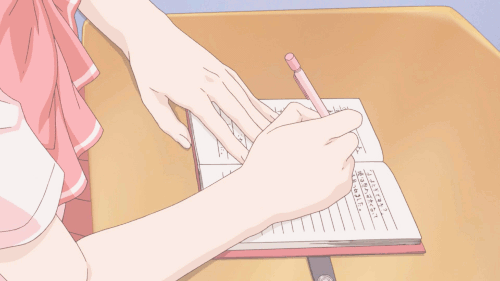
Hi! I have a very short attention span, and I have never really been able to make it through a course or textbook without giving up straight away, so I have never really been able to learn languages in the traditional way. I also very easily get bored with learners material, so I mostly stick to native material to consume my target language. Here is how I do it at the beginner level!
I usually start off with an app to learn the basics of the alphabet, vocabulary and grammar. Most of the times, I use Duolingo. I rarely get past the first few units before I jump into native material. Still, this is a good jumping off point.
When I start with native material, I usually use YouTube videos (with subtitles in the target language), and focus on spoken language, because spoken language is less overwhelming, and involves less complex language and grammar. At this point, I find that books are far too dense and complex for me to handle. Others might enjoy the challenge. My current favourites for this are LingoPie (for French, Spanish, German, Italian and Russian) and Viki (for Korean, Japanese and Mandarin Chinese).
I learn the most important words and phrases as I go. I do NOT look up every word, unless I can understand at least 70% of the language. For this, I will try and write the words and phrases down, and memorise them. I might use a flashcard app too (Anki is my fave, but Quizlet and Memrise are good too). For languages like Japanese and Chinese that have lots of characters to memorise, I will use an app (wanikani and chineasy are my faves). I always make sure that I know how to pronounce and understand each word or phrase.
I will start texting native speakers in my target language on apps like Tandem and HelloTalk. I look up words as I go, and will ocasionally try speaking.
I start shadowing (i.e. repeat after native speakers, imitating the intonation and pronunciation). I use Easy Languages for this.
After a while, I start reading. I’ll usually start with wikihow articles, or fluentu articles in my target language. I’ll write down new words, test myself on them until I get them correct, and then put them into anki to review.
After a while, I’ll formally study some grammar. I’ll usually use a textbook for this. However, I don’t necessarily do it in a traditional way. I go through the entire textbook and make a cheat sheet which condenses all the information in it to a few pages. I’ll review it regularly, and do LOTS of writing practice. For irregular verbs, I’ll just use flashcards, and write them down repeatedly.
Then, I’ll get a speaking buddy (I usually find one on discord) and speak with them a few times a week.
After a while of doing all of this, I start reading fanfiction (usually translations of my faves). It’s difficult, but I try to read intensively (i.e. look up every word).
At this point, I start journaling, and posting on the website journaly.
I’ll listen to podcasts like innovative languages, coffee break languages and language transfer. These are usually good for learning about grammar.
I start intensively reading serious content once I feel like I’m at a confident B1 level. I would suggest using proper newspapers (like le monde for French or BBC for English) and try studying one article daily. After a while, you can start reading a YA book (try something you’ve never read before in any language). Study it chapter by chapter fairly intensively, and then reread it again and again until you understand the story. After you’re finished with a chapter, put the new vocabulary into an app and review fairly regularly.
At the B1 level, listen using two sources: intermediate podcasts and native material. Intermediate podcasts are usually labelled as such, and are IN the target language, but about various topics, like culture or history (innovative languages have some, for french there is inner french, piece of french, news in slow french and RFI:Savoirs, for Spanish there is dreaming Spanish and news in slow spanish, and for Korean there is Iyagi). For native material, continue watching youtube videos about topics that interest you, and consider watching both the news and films/TV shows.
At this point you should be able to construct gramatically correct (mostly - if you still have problems then go through a grammar course, or work through a textbook) and fairly complex texts. I would suggest now learning some essay phrases and writing an essay. You’ll be terrible at first, BELIEVE me, but the more you practice the better you get. You could also start trying to write fanfiction (tip: use full phrases you have found in other books or fanfiction).
Continue doing what you are doing (reading intensively and widely, speaking with your buddy, listening, writing essays and short stories) and I think that after a while you will be able to say you are conversational in another language.
Thanks for reading this post! I hope it was useful! (Also haha ig my break from langblr is over lol).
2K notes
·
View notes
Text

2022年3月31日
It's time for my March goals update! Let's just pretend I'm not posting this in the middle of April. This month was extremely busy in terms of work and personal life, so my studies once again had to be put on hold often. When self-studying or at least not studying in a formal situation with required readings or exams or homework, making time to study can be difficult. And even if you are studying formally, it can be difficult sometimes to push yourself to accomplish the work if there are other things going on in your life. But, I still tried to incorporate Japanese study daily, even if it was only kanji flashcards or learning a couple new vocabulary words.
3月の日本語の勉強のアップデートが4月の途中なんだけど始まります!今月は個人的に忙しくて、またあんまり勉強に集中ができなかった。一人で勉強している時勉強の時間を作るのは難しいね。授業受けってても、忙しい時にちゃんと宿題や勉強を終わらせるのは難しい。しかし、今月も毎日少しでも勉強をする努力した。漢字の暗記カードや新しい単語でも毎日勉強します。

My Goals at the Beginning of the Month
Spend at least 10 minutes per day studying Japanese
Learn one new vocabulary word a day
Review 5 kanji a day
Learn one new kanji a day
Active listening practice once a day
Reading practice once a week
Write more in Japanese
How I Studied This Month
Spent 5-10 minutes studying Japanese most days 〇
Learned at least one new vocabulary word a day 〇
Reviewed 5 kanji almost every day 〇
Learned no new kanji ✕
Actively listened to the news or kids' shows almost every day 〇
Read manga once a week for most weeks △
No Japanese writing practice ✕
〇 = completed, △ = partially completed, ✕ = did not complete
Primary Study Tools/Methods
Kanji flashcards on Quizlet (decks that I made with on'yomi, kun'yomi, and English meaning)
Japanese mobile phone dictionary - to look up new vocabulary words
Children's shows (いないいないばあっ!・おかあさんといっしょ・アンパンマン)
TV News (NHK)
Manga (ヲタクに恋は難しい)
This discord server
What Were My Strengths?
Kanji review - flashcards on the mobile app make it easy to study anytime, anywhere
Vocabulary - I was able to remember new vocabulary I learned from manga, TV shows, and daily life, because I only learned a few words at a time
What Were My Weaknesses?
Listening - I do well with children's shows, but the news is a different pace and so I miss some important points
Reading - Wotakoi (manga) was a higher level than I expected, and I had to look up a lot of words and idioms (thanks to @sienne-k 先輩 for providing a lot of the word definitions ^.^)
Things to Try Next Month
Keep up with daily active listening practice
Learn or review one grammar point a week
Write a sentence every day or 3 sentences every week - write in small chunks rather than all at once so that I actually do it rather than just talk about it
In May I will be traveling (and in April I will be preparing to travel) so my ability to formally study will be limited again. I will try to focus on studying in small doses rather than sitting down to do a long period of study since I won't have that much time.
5月旅行するつもりで、4月は友達に会ったり、旅行の準備したりするのでまた勉強時間が少ないはずだ。そしてまた毎日少しだけ勉強するつもりだ。教科書やワークブック使わずに勉強する方法を探している。
If you have any suggestions about studying-on-the-go, please let me know!
もし皆さんは時間がない時に勉強する方法があれば、是非教えてください!
36 notes
·
View notes
Text
Important Academic Reminders
there is no shame in asking for help
there is no shame in having a tutor
there is no shame in not getting As
there is no shame in not knowing what you want to study
there is no shame in having a job
there is no shame in struggling in a so-called "easy subject"
there is no shame in withdrawing from a course
there is no shame in changing your major
there is no shame in not taking a full load of classes in a semester
there is no shame in realizing your school may not be for you
hope these are useful :)
-love pika☁️
2K notes
·
View notes
Text


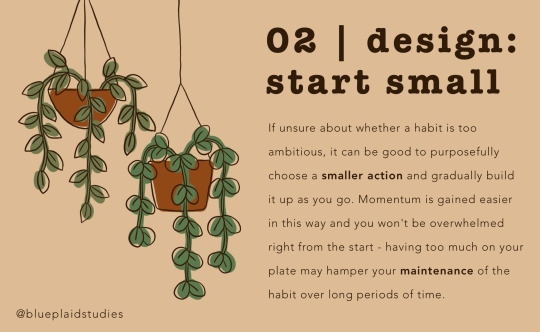
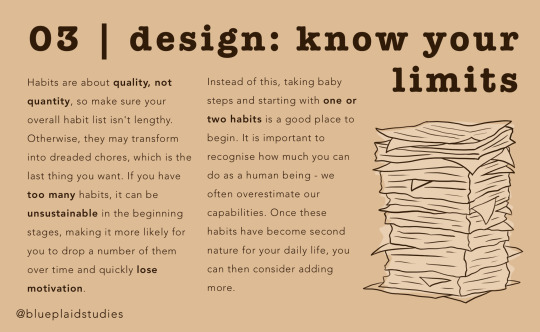
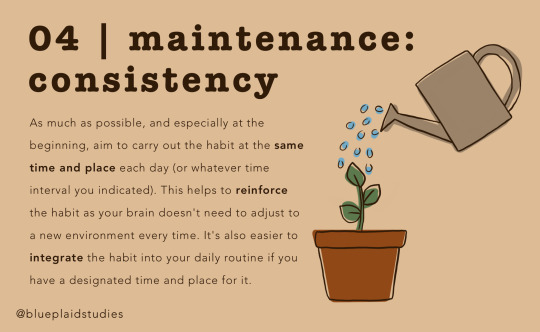
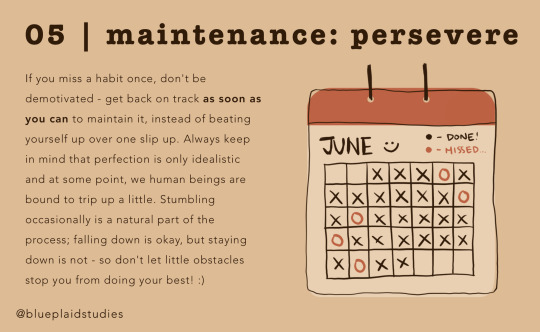
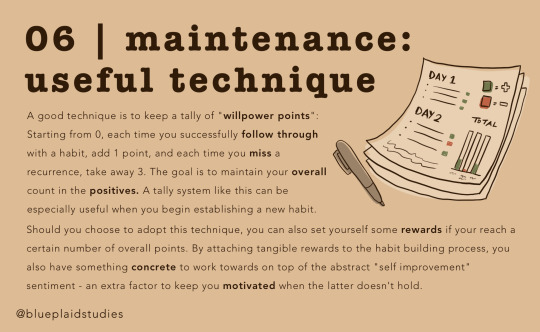
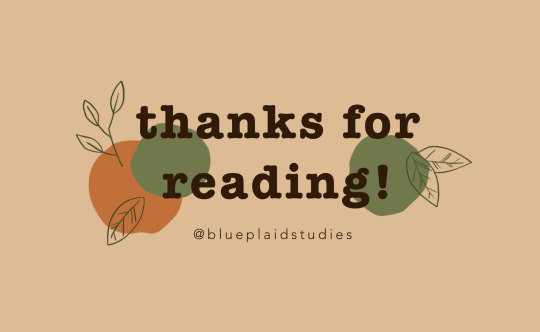
How to form habits that last
Click for better quality and zoom in.
Greetings! 💚 Here’s a little something I’ve been working on, which I hope you’ll find useful. :)
All text and graphics are created by me, Sal @blueplaidstudies.
☞ studygram
8K notes
·
View notes
Photo
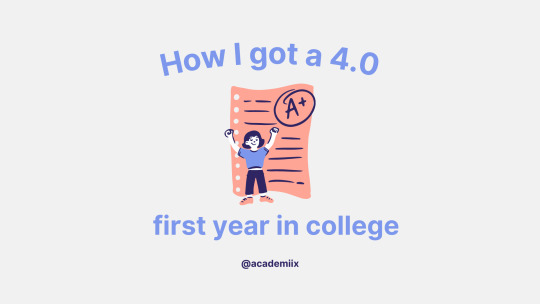
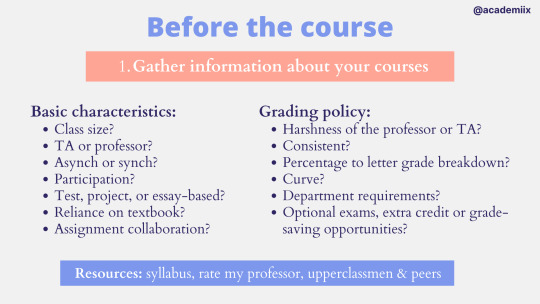

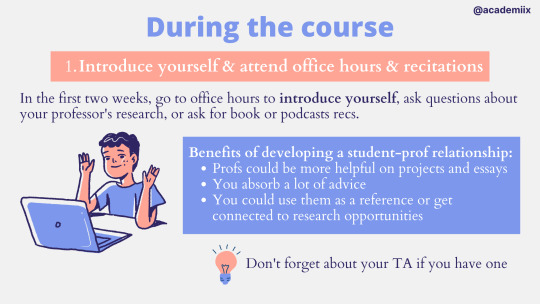
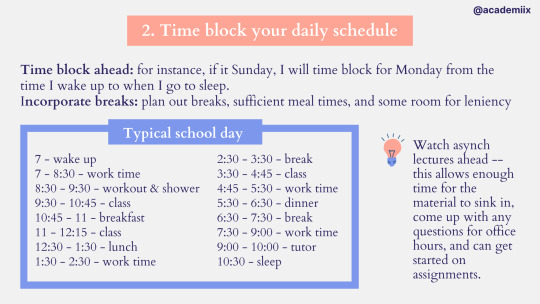
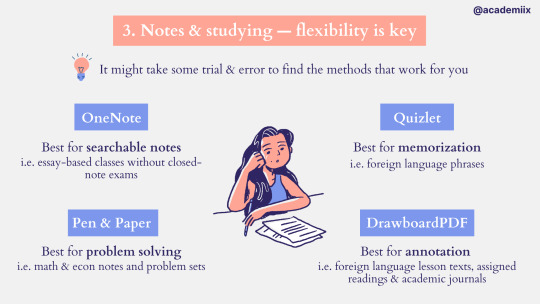
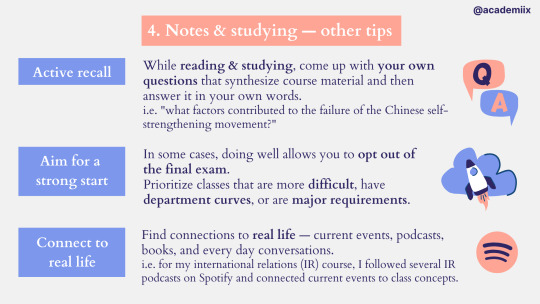
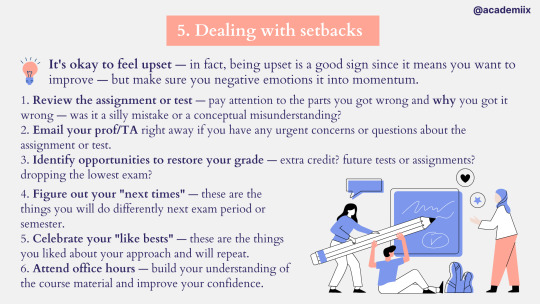
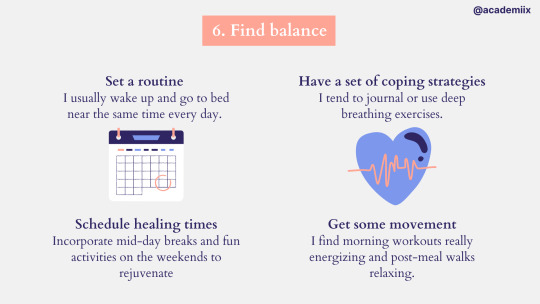
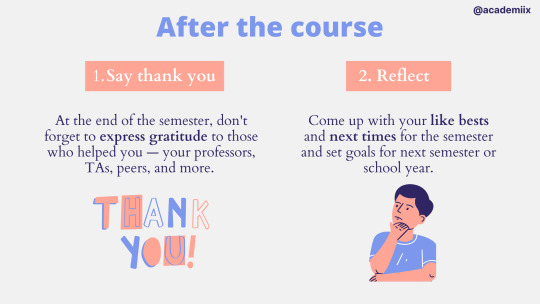
How I got a 4.0 first year in college | academiix
Watch the video version on Youtube.
View my other tips and masterposts.
6K notes
·
View notes
Text
Study Habits for Better Health
The 10-10-10 Rule for Eye Health
This is especially important for when you are using an electronic device to study as you tend to blink much less when using an electronic device in comparison to using analogue materials.
This can easily result in dry eyes, eye strain from blue light, and can, over time, eventually encourage the elongation of the eyeball which results in shortsightedness,
Every 10 minutes, take a 10 second break from looking at the screen by looking at an object that is at least 10 feet (approx. 3 metres) away from you
Personally, I find that it is most beneficial to look out a window at the environment around me to give my eyes relief from artificial light and to look at objects that are further away
If you do not have access to a window or an object far enough, looking at the furthest object you can find works well too
You can remember to do this by setting reminders, making a mental note while keeping an eye on the clock, or by incorporating this habit with the 10 minute planning technique
This helps with being more mindful of how much time you spend looking at a screen as well as monitoring how much time you have been working
Additionally, taking just a few seconds to look away from your screen allows you to be more conscious of your surroundings and to take stock of how you feel mentally and physically
I find that this habit has drastically improved my eye health and has reduced my stress when working
Taking a moment to step back from my work to focus on something within my environment prevents me from feeling overwhelmed by the work I'm doing
By removing myself from the situation, I allow myself to have an outsider's perspective and logically analyse how much I have left to do
Sometimes, when you're completing many tasks or large tasks, it feels like you're in a terribly huge pile of work but taking a step back allows you to regain control and say "It's only 3 tasks, I can do this"
Yoga Blocks, Textbooks, Pillows, or Variation for Spine Health
Often times, many of us tend to slouch or hunch over whilst studying or working. This consistent incorrect posture puts strain on your spine which can lead to inconvenient neck, shoulder, and back pain.
It is crucial to maintain correct and comfortable posture to ensure that our spine is in good health to allow us to work and go about our daily lives in comfort.
While sitting at my desk, I like to place a yoga block, a small textbook, a firm pillow, or a similar object perpendicular to my lower back and my chair
This instantly improves my posture by pushing me to sit upright rather than slouching or hunching over my desk
It is important to be lightly holding the yoga block or book perpendicular to the chair's backrest rather than leaning on the object
Heavily leaning on the object may pinch the spine and do more harm than good
Lightly holding the object makes your back muscles work consistently to make you sit upright which strengthens the back muscles and works to improve the overall alignment of the spine
This position must be comfortable, neutral, and feel natural
Another way of protecting your spine, as well as your whole body, is to work in different positions
Instead of the traditional work position of sitting at a desk, you could try standing, laying down on your front, or even sitting on your calves to work
Varying the positions in which the body is stationary for long periods of time prevents tension from building in specific areas which may lead to pain or cramping at a later stage
This also encourages the strengthening of the smaller muscles that assist in maintaining these positions
On occasion, I even like to study or watch lectures while holding a yoga position or stretching to keep my body in healthy condition
Pillows placed on your seat or behind your back can also help in protecting your spine from cramping or muscle soreness from sitting on a hard surface for prolonged periods of time
This option seems very simple but it can make the world of a difference in your comfort as you study
Maintaining Your Hand Health
Your hands are one of the most crucial components of your body. When studying, you use your hands to write, draw, type, and investigate. It is always important to take care of every part of your body but your hands need particular care.
When you are writing, ensure that your neck, torso, shoulders, arm, and hand are in a natural, comfortable, and neutral position
There should be no tension in your body and you should be sitting upright to prevent you from tiring easily
If you need to, rest your wrist on a small, plush object such as a a mousepad's wrist pad, a small cushion, a soft pencil case, or a folded piece of cloth
There is no single correct way to hold a pencil but there is criteria to help you find your personal optimal grip
You should be able to see exactly what you are writing without any of your fingers obstructing your view
Your hand should feel comfortable, controlled, and relaxed as you write
Your writing should be efficient, economic, and fluent
Using this criteria, my own pen grip is where my thumb, index, and middle fingers are the only fingers that hold and control my pencil while my ring and pinkie finger rest on my writing surface for support and mobility
When you are typing, your hand joints are vulnerable to strain due to the constant impacts of your fingers striking the keys
Even if your taps on the keys are gentle, this continuous movement can still strain the joints
Ensure that your wrist is relaxed and has a comfortable form of padding to rest on if you need to
Typing with all of your fingers helps distribute the force and movement of typing which results in less strain on each finger but learning this does take time and effort
With any form of using your hands, the most important health care for your hands is to stretch them
The simple act of stretching your hands greatly relieves muscle tension which assists in preventing the development of any ailments
Stretching your hands also improves mobility and assists with fine motor control to allow more precise and stable hand movements
The ideal stretches for the hands include extending your arm whilst turning your palm to the ceiling and gently pulling your four fingers downwards; gently pulling and rotating the thumb towards your upper arm with your palm facing inwards; clenching and unclenching your hands; wiggling your fingers; and interlocking your fingers and rotating your palms downwards to face away from you whilst extending your arms forward, then moving them above your head
You use your body as a vessel to gain knowledge from your physical environment.
Take good care of your body and it will take good care of your mind.♡
Education should always improve your mental and physical health.

2K notes
·
View notes
Text
speak in dramatic monologues to yourself. add background music by turning on your favorite playlist. take photographs of how beautiful the light is falling into the room. prioritize the tasks that make you feel like you are following your purpose. embellish your life. it is yours to create.
2K notes
·
View notes
Text
Tips For Studying When You're Burned Out:

(ideally, you shouldn't even be studying if you're burned out but we live in a shitty world and sometimes you gotta do what you gotta do)
don't look at your assignments as something you have to do. that leads to frustration and constant anxiety over procrastination. instead, think of them as something you want to do!! do them well for the sake of doing them well, not because you have a deadline in two hours.
start with the least emotionally taxing stuff first, like readings or some math warm-ups to get you into the groove. it'll help you ease into the right mindset so you can work properly.
use lifeat.io if you're on a computer!! they have amazing virtual study spaces which have helped me focus whenever i'm in a less-than-ideal situation with a lot of noise and distraction.
listen to calm music if you're the type that needs headphones in to do anything. a good example would be lofi hip-hop or some uplifting classical music. angsty indie is fine, but crying in the middle of your economics essay probably isn't the best use of your time.
if you've been working on something for a few hours and don't understand the topic, take a break and do something else (don't scroll through social media, you'll end up losing an hour or so procrastinating). recharge with a warm drink and let your brain reset. you're more tired than you know.
khan academy and photomath are your best friends. use any and ALL online resources you have, it'll save you a lot of energy!!
if you absolutely can't cope up/know you can't prevent the inevitable, please, please email your prof beforehand!! state clearly the reason why you're not able to complete the work they assigned and what you're going to do to make it up. most of the time they'll be understanding and extend your deadline.
but if your prof is that 5% which doesn't care about your mental health and/or thinks you're slacking off, you probably should have a conversation with your mentor and re-evaluate whether being in that class is the right thing for you.
stay safe and take care of yourself lovelies, you'll make it through this!! <3
2K notes
·
View notes
Text
tips for maintaining mental stability when it feels too much
-> don't gaslight yourself into thinking that your feelings are too much. Don't blame yourself for wanting to recharge or distant yourself as well. Whatever you feel is valid. Realize that your emotions are temporary. It is important to feel them and not suppress them but emotions are something that comes and goes. You won't feel that way after some time
-> cut off sensitive topics. Stop checking on the news if it feels too much. Mute or unfollow those who post triggering content. Tell your friends and family members that you don't want to talk about certain topics. It's okay to distant yourself not only from the news but from people/topics you find toxic.
-> rely on safe content instead. Re-read your favorite book or re-watch a show that makes you feel better. Use messengers instead of socials to contact your close ones.
-> sleep. Sleep washes off emotions and can calm you down, and recharge you.
-> invest your time in a hobby. Shift your focus a little. Hobbies that involve physical and/or sensual activity work even better. These can be painting, knitting, gardening, dancing, or singing.
-> go outside. Walk your dog or jog a little. Make your body move and breathe fresh air. Connect with your surroundings, visit your local park or forest.
-> realize what you can do at the very moment to support yourself and your close ones. Do what you can do to prepare yourself for tomorrow, step-by-step.
Take care of yourself 💖🌍
#self care

6K notes
·
View notes
Text
﹙☆ ) intelligence affirmations 🧠🎒💋
✎ I'm the prime example that pretty girls always get the highest grades effortlessly
✎ I find myself learning any subject easily
✎ I always ace all exams and tests
✎ I am a top student, the best student of all classes
✎ My knowledge and intelligence are both infinite
✎ I love studying, i could spend hours studying and enriching my knowledge nonstop because it's my favorite hobby 😽
✎ I do my assignments the moment i get them
✎ Im always motivated to study
✎ I never let anything distract me while studying
✎ I have a high attention span
✎ I always got the right answers, I'm naturally smart
✎ Everyone wants to be as smart and educated as me
✎ getting the best grades on every tests, quizzes and exames comes naturally to me
✎ I'm always motivated and disciplined to study
✎ I'm genuinely passionated about studying
3K notes
·
View notes
Text
Study Motivators That Work
The 3 Minute Rule
When you have a task that you don't want to complete, just get started and keep going for 3 minutes. If you still don't want to complete the task after 3 minutes, stop and start another task
This method can be very challenging during the initial stages of trying it
When you procrastinate, you tend to find something else to do first to dodge the main task at hand
This rule forces you to immediately avoid any deviation from completing the task for 3 solid minutes with the option to stop after those 3 minutes
Discipline plays a crucial role in this motivation technique as starting the 3 minutes requires you to overcome procrastination
Something that helps in this process is trying to slightly mentally detach yourself from the situation to have an objective view on it
You need to look at the situation and acknowledge that you have the freedom to stop the task after 3 minutes if you truly cannot complete it and that you absolutely must start the task immediately
Often times, I keep going once I start which results in significantly improved productivity
Flexibile Schedules
Often times, I plan out the perfect study and work session with my tasks and times detailed to the second
However, sometimes, life gets in the way of these plans and I'm forced to reschedule everything
Something like this can be extremely demotivating, especially if your day revolved around your very detailed plan
To help solve such issues, there are 2 options for 2 different scenarios
The first option is to prevent the situation from occurring at all
Extremely rigid and detailed plans are very easy to disrupt
Preventing the situation would be done by outlining more flexible study and work plans that can be done at most times and don't rely on strict timings (I will post another article on creating a flexible and functional study schedule)
The second option is how to move forward if you do find yourself in a situation where your study plans have been disrupted and you're demotivated
In this instance, the first step is to list the topics you need to cover and sort them from most important to least important
Estimate how much time each topic will take and look at how much time you have available
Evaluate if the time you have available is adequate to completely cover all of your listed topics
If not, choose as many topics with the greatest priority that will be able to be completed within your available time
Remember, these steps should be completed within 5 minutes at most to prevent you from losing any more time
There's always a plan for every situation. It just needs to be found.
Justify It
If you truly feel like there's no reason to compete the task, find a reason
If the task is important enough for you to lament over it, it's certainly important enough for you to complete it as soon as possible
Clear your mind of any frustration and just relax
Think of what the purpose of the task is
Do you need to complete an assignment that will be a part of your final grade?
Do you need to complete a report for your job?
Will this benefit you in the future - near or far?
If you need to study, what is your end goal?
When I hesitate with my studying, I always remind myself that what I'm learning now will one day help me improve as a doctor
Once you identify a reason, act on it and complete the task
The reason will help you sense that what you're doing has meaning and purpose, making the task less of an inconvenience and more of a duty
Knowledge is always valuable.

4K notes
·
View notes
Text
Chrome extensions I actually use as a mentally ill university student
Making websites easier to digest:
Dark Reader - Changes any webpage to dark mode.
Mercury Reader - Simplifies the layout of any webpage to eliminate distractions and irritating formatting.
Podcastle AI - Turns any article into a podcast. This is a lifesaver for being able to process what I’m reading, to be honest.
Spelling/grammar:
LanguageTool - Spelling and grammar check for those of us who regularly type in more than one language.
Grammarly - Spelling and grammar check for those of us who only type in English. Can be used with LanguageTool installed, which is what I do.
Google Dictionary - Define any word on the webpage with a double-click.
Google Translate - Translate an entire webpage or even just a short segment.
Misc:
AdGuard Adblocker - After trying quite a few adblocker options, this is the one I find the best.
The Great Suspender - Automatically suspend inactive tabs to help with performance. <- as an edit, I don’t believe this is available anymore
Honey - Try coupon codes automatically to save money on online purchases.
Built-in Chrome tab grouping - Group your tabs to keep organized and minimize distracting clutter.
26K notes
·
View notes
Text
Quick ADHD and study tips:
- Do the minimum. Don't do any more than the school expects you to do. Don't overwork yourself trying to become an expert on every topic ever, making every project a perfect masterpiece.
-> "I'll just do this quickly" method - Do the minimum. What's the least you can do for this topic, the easiest, most minimalist, "laziest" solution possible? Do it. It helps to get started. (exactly what I did here)
- Adjust your routine to a radio's broadcasting schedule (it's background music and "company", aka. chatter in the background)
- Pomodoro timers are too hard to reach from YouTube, here, an extension. (It plays white noise, and makes me miss the sound of rain in the breaks XD)
- Switch from Word to a notepad, a colored paper, google translator, a tumblr draft, etc., write your essay there.
- Water reminder.
- Too tired to design a PPT: SlidesGo Templates
- Too tired for grammar: Grammarly (or ProWritingAid)
- Too tired for words: Wordtune and Wordtune Read
- This grades essays, this estimates reading time
- This for grammar check, this is for synonyms, acronyms, and everything, this for idioms.
- Set BeLineReader to something colorful (space colors ✨)
- Write it in memes (see the first part of this post), use emojis, make memes, use meme language, edit it like a tumblr post with highlights, side notes, pictures, colors, etc.
- Tell it to someone. There was a history topic I very much disliked until I started to read it, and man, it was hilarious. The warlords made the worst decisions possible! Of course, I told my brother about it.
Look at it as a masterpiece or look at it as a ridiculously bad movie, it will get better. (This goes for literature, history, etc. - why not "make it" into a soap opera? XD)
- Do it while you wait for something. The water to boil, the baguettes to bake, someone to answer your message. And in the meantime, do something.
- For revisions: Loop a song. One topic-one song. Then you switch the song, next topic. It's even better if the songs are from completely different genres.
- Have a list of stuff you have to do. An optional list. If you can tick off one, you're good. Leave your accomplishments.
[Stuff like, 'write a poem', 'make cocoa', 'sing,' but also, 'eat breakfast normally' and 'write that English essay'.]
(-> Computer "gadgets" (idk what are they called in English) -> set tiny slideshows, and bamm, little reminders that are always visible!
I made the text in Ipiccy, the to-do list in paint)
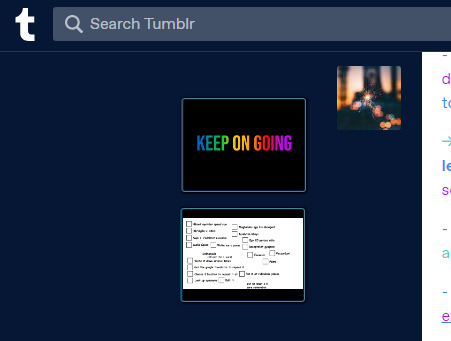
[ID: A partial screenshot of my tumblr, with the two gadgets on it, displaying two small pictures, one is a color gradient text on a black background that reads "keep on going", the other is a bit messy to-do list with check squares and simple text on a white background / end of ID]
How to remember anything?/learn stuff
Create (write a poem, make memes, try reading it out loud, but singing, act it out XD - the possibilities are endless!)
Bee dance ("write down" the letters of the word or numbers of the date walking around)
Make it touchable (form the numbers/letters from plasticine, sticks, gravel, ketchup, candy, shoes, or anything, really)
-> Morse / ASL (knock, clap, or sign the numbers/letters)
Tell it in different styles, on different levels (to a kid, to your dog, to your plant. "Emotionally" as if you were telling some outrageous news, or as if it was the greatest thing in the world! It's ridiculous, it's nonsense! It's so stupid, it's brilliant! It's tragic, actually.
Tell it professionally, as if you knew what you're talking about, like some sassy professor. Tell it as if it happened next door, as if you were some old folk telling it to the children (the good ol' times!), tell it like a bored weather forecaster, present it like in some tv ad!)
Learn it at places (literally, bring your book/little paper to a corner of the house, or out to the park. It's a bit like the mind palace method, "hmm, yes, 1945, the blue shower gel bottle, "amygdala" is in the fridge, and Thales' Theorem is right under the bed.")
The mind palace method, but place the data on a picture (take a picture, a stock photo, anything, and write dates/words at different places)
Speed run (set a timer, it can be Pomodoro, and do what you have to do on max speed. Yes, you got x minutes to sit at this one spot in the bathroom and memorize these words, drink tea, and take out the trash! The clock is ticking! It's adrenalin rush!)
Tie it up with the senses (pick a color/palette, a taste, a smell, a feel, a texture, a style, etc. for each topic you can recall later.
Chew a specific tasted gum while studying, chew the same taste while writing the test. Spray a perfume, set your desktop/phone background to a picture that fits the mood, set the lights, surround yourself with a specific texture, create a mood.)
Make a cheat sheet (write it in a "compressed format," so only you can understand it, and it takes up the least place possible. Tiny drawings, reminders. The point is not to have the information but to have a safe reminder in your pocket, you can reach out to.
You may not even need to use it.)
Have water and sleep (yup, a dehydrated brain can't think, and our brains process information while in REM sleep - a sleep cycle calculator)
Play card games, Activity (do you know the board game "Activity?" Or twenty questions? There are also a bunch of card games [mainly played with French cards] where you have to yell words and smash cards and each other's hands. Well, why not rewrite the game with the words/dates/phrases you need to memorize? Even better if you play it with people who study the same thing as you.)
So, that's it for now. I hope I helped some! :D
3K notes
·
View notes
Text
28-04-22


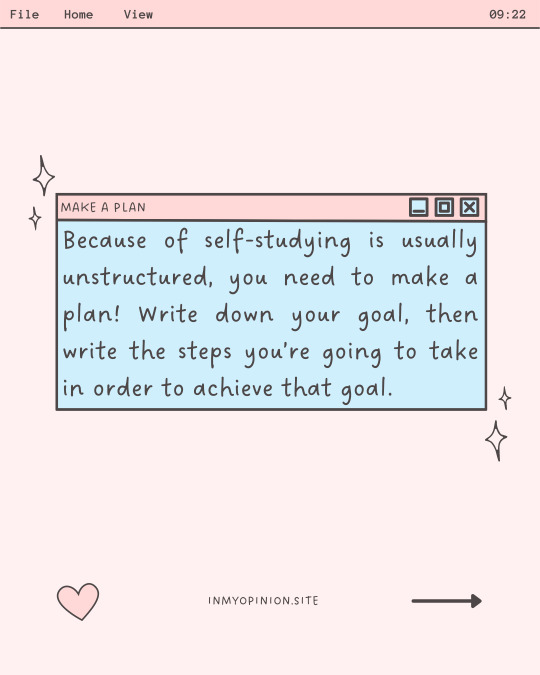
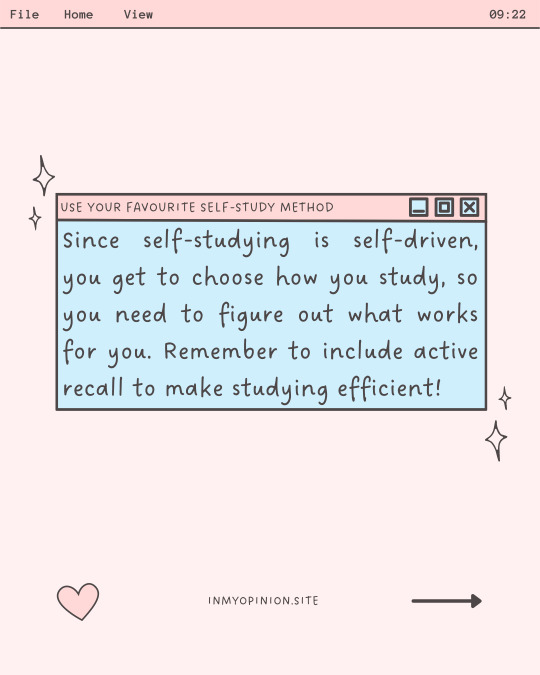


how to self-study
hey kiddos! here's my comprehensive guide on how to self-study. whether you're learning a language, taking an online course, or just revising, these tips might be helpful! check out my blog for the full article!
623 notes
·
View notes
Text
Hi, I'm Chesire. I'm 19 going on 20, and I'm currently try to start working on getting my GED. My goal is to use this blog to try and keep me motivated on earning it. I've kept saying I'm gonna get my GED but I've never seriously tried getting it, so hopefully this blog keeps my up to it!
1 note
·
View note